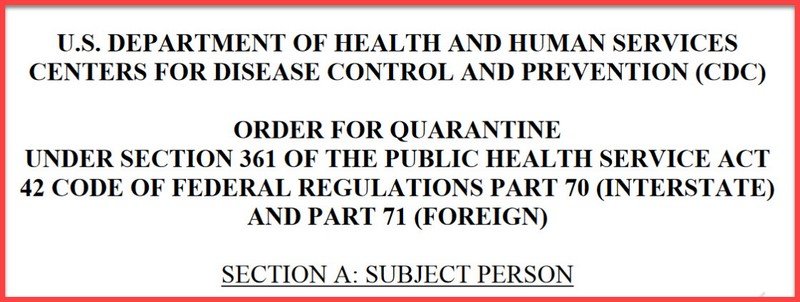Absolutely.
Federal Legislation Regarding Quarantine and Isolation
Under 42 CFR 70, the Federal Government has the authority to restrict movement of individuals between states and to take other measures deemed reasonably necessary to prevent the spread of disease. This authority has been delegated to the Director of the Centers for Disease Control.
Under 42 CFR § 70.6, the Director (or another authorized representative) may authorize apprehension and detention of any individual to prevent the spread of communicable diseases if the individual is “reasonably believed” to have a quarantinable disease and may either move between states or may infect others who may move between states. Note that ability to detain does not require that the individual actually have the disease – only that the person is “reasonably believed” to have the disease.
Under 42 CFR § 70.10, the government may perform “public health prevention measures” at any locations where people gather for interstate travel, including airports, bus stations, sea ports, and railway stations. There, people may be subject to questioning, review of travel history and other records, and “non-invasive” testing or procedures.
In those individuals subject to quarantine or isolation, 42 CFR § 70.12 allows the government to order medical examinations to determine the individual’s health status and potential public health risk to others. Medical examinations may include questioning, a physical examination, and collection of human biological samples for laboratory testing.
Individuals can be fined up to $250,000 if violations of this section result in the death of another individual and up to $100,000 if violations of this section do not result in death. For organizations, the maximum fines are doubled.
The Public Health Service Act (42 U.S. Code § 264) also contains similar language regarding the federal government’s ability to detain and examine people with potentially communicable diseases.
Want to see what a quarantine order looks like? The CDC posted a sample quarantine order here.
State Legislation Regarding Quarantine and Isolation
Each state government has the power to quarantine or isolate individuals within its borders. The laws and penalties for compliance vary between states. For a summary of State quarantine and isolation statutes, see the National Conference of State Legislatures web site here.
In many states, failure to abide by an order of quarantine or isolation is punishable as a criminal offense and can result in incarceration. In Mississippi, New Hampshire, South Carolina, and Texas, failure to abide by orders of quarantine or isolation can be charged as a felony.
Don’t Be THAT Guy
One Kentucky resident was diagnosed with coronavirus at the University of Louisville, then left against medical advice. He was instructed by the health department to self-quarantine, but refused. Once a judge found out, he declared a state of emergency and the patient now has law enforcement stationed outside his house 24 hours a day to make sure he doesn’t leave. In many states, it is illegal to knowingly transmit a sexually transmitted disease to another person. See Summary from CDC here. It is conceivable that under the right circumstances, a prosecutor could argue that the laws against knowingly transmitting STDs also applies to knowingly transmitting other potentially dangerous communicable diseases – such as COVID-19.
Don’t Be THIS Guy, either
After being arrested for making terroristic threats, another Kentucky resident told police that he was exposed to COVID-19. The police took the patient to a hospital where he was examined, had no symptoms, and then released. The police were then able to disprove his story about COVID-19 exposure. Now he’s charged not only with making terroristic threats, but also with disorderly conduct and “falsely reporting an incident.”
Coronavirus Quarantine Update March 17, 2020
San Francisco and five other Bay counties have been placed under a “shelter in place” order. See copy of order at this link. People may leave their homes only for “essential” activities and “essential” businesses or government services. Violation of the order is a misdemeanor punishable by fine or imprisonment.
More information about the Bay area shelter in place order can be found at the following links:
Bay Area orders ‘shelter in place,’ only essential businesses open in 6 counties.
Bay Area coronavirus shutdown: How life will change with new shelter-in-place order.
Santa Cruz Health Services Agency web site.
New York City Mayor Bill de Blasio warns of likely shelter in place order for New York City while New York Governor Andrew Cuomo dismisses the idea.
